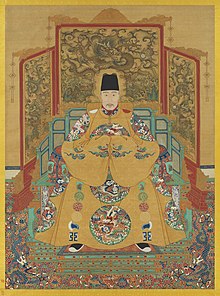
Back جيا جينغ Arabic الامبراطور جياجينج ARZ چیاچینگ AZB Jiajing Catalan Gă-cêng Huòng-dá̤ CDO Ťia-ťing Czech Jiajing German Ĝiaĝing Esperanto Jiajing Spanish چیاچینگ Persian
| Jiajing Emperor 嘉靖帝 | |||||||||||||||||
|---|---|---|---|---|---|---|---|---|---|---|---|---|---|---|---|---|---|
 | |||||||||||||||||
| Emperor of the Ming dynasty | |||||||||||||||||
| Reign | 27 May 1521 – 23 January 1567 | ||||||||||||||||
| Enthronement | 27 May 1521 | ||||||||||||||||
| Predecessor | Zhengde Emperor | ||||||||||||||||
| Successor | Longqing Emperor | ||||||||||||||||
| Prince of Xing | |||||||||||||||||
| Tenure | 15 April 1521 – 27 May 1521 | ||||||||||||||||
| Predecessor | Zhu Youyuan, Prince Xian of Xing | ||||||||||||||||
| Born | 16 September 1507 Zhengde 2, 10th day of the 8th month (正德二年八月初十日) Anluzhou, Huguang Province, Ming dynasty | ||||||||||||||||
| Died | 23 January 1567 (aged 59) Jiajing 45, 14th day of the 12th month (嘉靖四十五年十二月十四日) Palace of Heavenly Purity, Forbidden City, Beijing, Ming dynasty | ||||||||||||||||
| Burial | Yongling Mausoleum, Ming tombs, Beijing | ||||||||||||||||
| Consorts | |||||||||||||||||
| Issue Detail | |||||||||||||||||
| |||||||||||||||||
| House | Zhu | ||||||||||||||||
| Dynasty | Ming | ||||||||||||||||
| Father | Zhu Youyuan | ||||||||||||||||
| Mother | Empress Cixiaoxian | ||||||||||||||||
The Jiajing Emperor (Chinese: 嘉靖帝; pinyin: Jiājìng Dì; Wade–Giles: Chia-ching Ti; 16 September 1507 – 23 January 1567), also known by his temple name as the Emperor Shizong of Ming (明世宗), personal name Zhu Houcong (朱厚熜), was the 12th emperor of the Ming dynasty, reigning from 1521 to 1567. He succeeded his cousin, the Zhengde Emperor. "Jiajing", the era name of his reign, means "admirable tranquility".
Zhu Houcong was born as a cousin of the reigning Zhengde Emperor, so his accession to the throne was unexpected. However, when the Zhengde Emperor died without an heir, the government, led by Senior Grand Secretary Yang Tinghe and the Empress Dowager Zhang, chose Zhu Houcong as the new ruler. However, after his enthronement, a dispute arose between the emperor and most of the officials regarding the method of legalizing his accession. The Great Rites Controversy was a major political problem at the beginning of his reign. After three years, the emperor emerged victorious, with his main opponents either banished from court or executed.
The Jiajing Emperor, like the Zhengde Emperor, made the decision to reside outside of Beijing's Forbidden City. In 1542, he relocated to the West Park, located in the middle of Beijing and west of the Forbidden City. He constructed a complex of palaces and Taoist temples in the West Park, drawing inspiration from the Taoist belief of the Land of Immortals. Within the West Park, he surrounded himself with a group of loyal eunuchs, Taoist monks, and trusted advisers (including Grand Secretaries and Ministers of Rites) who assisted him in managing the state bureaucracy. The Jiajing Emperor's team of advisers and Grand Secretaries were led by Zhang Fujing (張孚敬), Xia Yan, Yan Song, and Xu Jie in succession.
At the start of the Jiajing Emperor's reign, the borders were relatively peaceful. In the north, the Mongols were initially embroiled in internal conflicts. However, after being united by Altan Khan in the 1540s, they began to demand the restoration of free trade. The emperor, however, refused and attempted to close the borders with fortifications, including the Great Wall of China. In response, Altan Khan launched raids and even attacked the outskirts of Beijing in 1550. The conflict only came to an end during the Longqing emperor's reign, when he allowed trade to resume. In the Jiajing era, Wokou pirates posed a significant threat to the southeastern provinces of Zhejiang, Fujian, and Guangdong. The Ming authorities attempted to address this issue by implementing stricter laws against private overseas trade in the 1520s. However, piracy continued to escalate, reaching its peak in the 1550s. It was not until the 1560s, and then in 1567 when the Longqing Emperor relaxed laws against maritime trade that the problem was suppressed.
In 1556, northern China was struck by a devastating natural disaster—the deadliest earthquake in human history, with its epicenter in Shaanxi. The earthquake claimed the lives of over 800,000 people. Despite the destruction caused by the disaster, the economy continued to develop, with growth in agriculture, industry, and trade. As the economy flourished, so did society, with the traditional Confucian interpretation of Zhuism giving way to Wang Yangming's more individualistic beliefs. However, in his later years, the emperor's pursuit of immortality led to questionable actions, such as his interest in young girls and alchemy. He even sent Taoist priests across the land to collect rare minerals for life-extending potions. Unfortunately, these elixirs contained harmful substances like arsenic, lead, and mercury, which ultimately caused health problems and may have shortened the emperor's life.